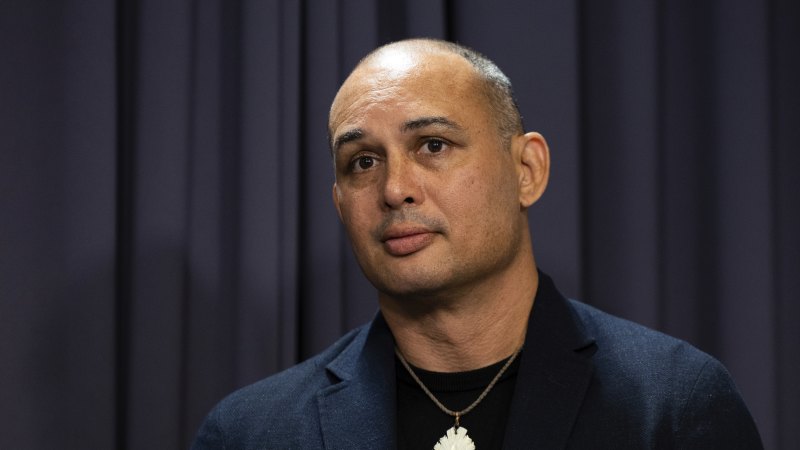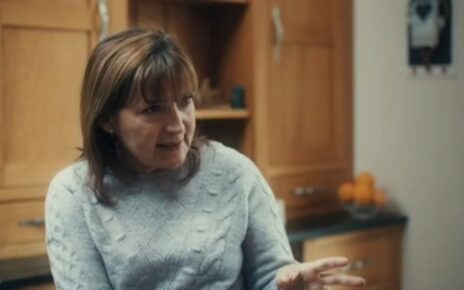Save articles for later
Add articles to your saved list and come back to them any time.
Nine has apologised for running a Voice No campaign ad in The Australian Financial Review newspaper that has been heavily criticised as racist for its cartoon portrayal of Yes campaigner Thomas Mayo, who appeared to be dancing for money.
The ad by conservative lobby group Advance Australia, which ran across a full page in the newspaper on Thursday, depicted Mayo reaching for a wad of cash from Wesfarmers chairman Michael Chaney in a cartoon that ridicules the financial support that big corporates have given the Yes campaign.
The ad depicting Yes campaigner Thomas Mayo reaching for a wad of cash from Wesfarmers chairman Michael Chaney has been widely criticised.Credit: Alex Ellinghausen
A spokesman for Nine, which owns the paper and this masthead, said it regretted running the ad.
“The political advertisement about the Voice referendum placed into today’s Financial Review should not have run and we apologise for that. We want to encourage a mature debate from both sides and avoid personal and/or inappropriate attacks,” the spokesman said.
The criticism of the ad comes a day after Labor and the Coalition traded barbs over the language and tactics used to prosecute the Indigenous Voice debate.
NSW state Liberal MP Matt Kean, who supports the Voice, condemned the ad as having “no place in Australian politics”, alleging it used a “racist trope” to depict Mayo.
“It’s a throwback to the Jim Crow era of the Deep South. The No Campaign has every right to be heard but can do much better than this,” Kean tweeted.
Independent federal MP Kate Chaney, who is depicted wearing a teal dress and perching on the lap of her father as he offers the money to Mayo, said the No campaign was “stooping to personal and racist attacks”. Wesfarmers has donated $2 million to the Yes23 campaign and both Chaney and her father have been vocal supporters of the Voice.
“Ultimately, I think people will vote in the referendum based on what is fair and useful, not based on fear and hate,” Chaney said.
A number of federal MPs also weighed in on Twitter, expressing their disgust, including Liberal backbencher Bridget Archer, Labor MP Alicia Payne, and teal independent MPs Monique Ryan and Sophie Scamps.
Responding to the backlash, an Advance Australia spokesman said: “Matt Kean can keep his elitist Sydney views to himself.”
“There it is again, the Yes campaign elites playing the race card straight off the top of the deck,” the spokesman said.
Yes23, where Mayo is a director, has been contacted for comment. Wesfarmers declined to comment.
Coalition frontbencher Jacinta Nampijinpa Price, who is leading the anti-Voice vehicle Fair Australia, which is tied to Advance Australia, has been contacted for comment about whether she supports the ad.
The furore comes amid another messy week in the Voice debate.
Indigenous Australians Minister Linda Burney on Wednesday accused Opposition Leader Peter Dutton of being a “bully boy” for attacking Wesfarmers and other corporates over their support for the Voice, and Fair Australia of using “Trump-style politics” to sow division around the referendum. Price later accused Burney was using bullying tactics herself to ostracise No voters.
In a separate development on Thursday, independent Victorian senator Lidia Thorpe claimed she had been excluded by the Coalition from contributing to the No case in the official Voice referendum pamphlet, and will instead issue her own statement to voters outlining why “the Voice is not a step in the right direction”.
Thorpe, who is leading a radical anti-Voice campaign, said the Coalition had made it clear to her office that her input would be considered only if it aligned with its priorities.
“I’ve been excluded from the writing of the No pamphlet as there are no processes in place to provide a fair discussion of what should be in it or to ensure that my analysis of the Voice will be shared with the Australian people,” Thorpe said in a statement on Thursday.
“I will be putting out a statement on the Voice with a focus on providing information to those voting on the referendum that is factual, explains how the Voice is just another advisory body that can be ignored by government and was not informed by self-determination. The Voice is not a step in the right direction.”
Thorpe’s so-called “progressive No” campaign argues the Voice should be opposed because it is powerless and constitutional recognition undermines Indigenous sovereignty.
Earlier this week, this masthead revealed that Price had met with One Nation leader Pauline Hanson to discuss her potential contribution to the pamphlet.
Price, who is steering the Coalition committee working on the pamphlet, did not respond directly to Thorpe’s claims, but said the committee “will consider the views of many people” who opposed the Voice.
Under the referendum rules, the Australian Electoral Commission is required to distribute a Yes/No pamphlet to every Australian household at least 14 days before the vote. There is no legal requirement for the pamphlet to be truthful or accurate.
The written Yes and No cases are formulated by the majority of politicians who voted Yes or No to the referendum bill in the parliament, meaning the government will control the Yes case and the Coalition will control the No case.
Cut through the noise of federal politics with news, views and expert analysis from Jacqueline Maley. Subscribers can sign up to our weekly Inside Politics newsletter here.
Most Viewed in Politics
From our partners
Source: Read Full Article


